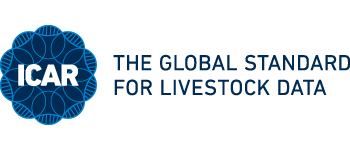“Development and Application of a Certified Reference Material for Somatic Cell Counting in Milk’”
Background
Milk somatic cell count is a widely used indicator for monitoring the udder health of several mammalian species and is relevant in food quality regulations, milk payment testing, farm management and breeding programmes . In February 2020 the EC Joint Research Centre (EC JRC) launched a new certified reference material for somatic cell counting in milk. The launch is one of the tangible outcomes of a close cooperation of the International Dairy Federation (IDF), the International Committee for Animal Recording (ICAR) and EC JRC in developing solutions and tools to promote a better global equivalence in somatic cell counting in milk.
This webinar will go into the development and the possible applications of the certified reference material and how to cope with transition issues in case of re-anchoring routine somatic cell counting to this now available ‘golden’ standard.
Target audiences are representatives from dairy and other laboratories conducting somatic cell counting, providers from secondary reference materials, regulatory bodies, dairy associations, milk recording and breeding organisations, mastitis specialists and others interested.
Programme and presented files
- Introduction (5 min)
Christian Baumgartner – Milchprüfring Bayern e.V. (DE) - Development and production of certified reference materials (CRMs) for somatic cell counting in milk
Reinhard Zeleny – EC-JRC (EU) - Application of the EC JRC CRM with somatic cell counting in milk
Harrie van den Bijgaart – Qlip B.V. (NL) - Assigned values in ICAR Proficiency Testing made traceable with EC JRC CRM
Silvia Orlandini – ICAR (IT) - Q&A (10+ min)
Under the moderation of Christian Baumgartner
Bios of speakers
Christian Baumgartner
Being a vet and cattle specialist by education, Christian has long-term experience in non-profit organizations, in managing as well as in board positions, covering activities in veterinary medicine, milk production, dairy industry and research as well as in sports on national and international level.
As lab professional for raw milk analysis and expert for international harmonization and standardization of analytical methods and procedures he contributed in different international organizations as expert and action team leader.
Currently he is the Managing Director of Milchprüfring Bayern and of AiM GmbH, Munich, thereby laying focus on research projects to improve dairy herd management and animal welfare in dairy cattle.
Reinhard Zeleny
Reinhard Zeleny holds a PhD degree in food- and biotechnology from the University of Natural Resources and Life Sciences “BOKU” in Vienna. In his early professional career he was a fellow and temporary agent at EC-JRC-IRMM with research and reference materials projects in the food area in combination with a senior post-doc at BOKU (glycobiology research work). Currently, he is permanently employed at EC-JRC in Geel and project responsible for food and biological reference materials and feasibility studies (veterinary drugs, food authenticity, food microbiology, biosecurity). He is a past member of the Organic Analysis Working Group of the Consultative Committee for Amount of Substance: Metrology in Chemistry and Biology (CCQM) and work package leader in EuroBioTox biosecurity, a Horizon 2020 project. Furthermore, he is an editorial board member of Food Chemistry.
Harrie van den Bijgaart
Harrie van den Bijgaart studied Food Science and Technology at Wageningen Agricultural University. Since 1987 he has held several management positions with raw milk and dairy product testing. At present he is working as Manager Innovation & Business Development with Qlip in The Netherlands.
Since the mid-nineties he has acted as a project leader in the development of several ISO/IDF standards and has been active in various roles in ICAR. He is a past chair of the IDF Methods Standards Steering Group, of ISO/TC 34/SC 5 and of CEN/TC 302, all on methods of analysis and sampling for milk and milk products. Since 2009 until recently he has acted as Project Leader of the joint IDF/ICAR Project Group ‘Reference System for Somatic Cell Counting in Milk.
Silvia Orlandini
Silvia Orlandini is a biologist with extensive experience in milk analyses and the related development and supply of reference materials, which was built during her work as coordinator of the Italian Breeders Association Laboratorio Standard Latte (AIA-LSL).
Since 2015 she is working as a consultant for Milchprüfring Bayern (DE) and for ICAR (International Committee for Animal recording). In ICAR she is responsible for the ICAR proficiency testing programme and for the process of milk analyser certification.
She is a past Chair of the IDF Standing Committee Statistics and Automation and still co-chairing the permanent IDF Action Team on Statistics of Analytical Data. Since 2000 she has coordinated and contributed in the development and revision of several joint ISO/IDF standards for the dairy sector.
About IDF
Helping nourish the world with safe and sustainable dairy The IDF is the leading source of scientific and technical expertise for all stakeholders of the dairy chain. Since 1903, IDF has provided a mechanism for the dairy sector to reach global consensus on how to help feed the world with safe and sustainable dairy products.
A recognized international authority in the development of science-based standards for the dairy sector, IDF has an important role to play in ensuring the right policies, standards, practices and regulations are in place to ensure the world’s dairy products are safe and sustainable.
Media contact: communications@fil-idf.org
About ICAR
ICAR is the recognised global standard for livestock recording. Since its inception in 1951 ICAR has promoted the development and improvement of animal identification, performance recording and evaluation in farm animal production. This is achieved through the establishment of guidelines and standards, specific for the purpose of identifying animals, the registration of their parentage, recording their performance and evaluating their genetics, (including their bearing on animal health, care, productivity, food safety and the environment). Through its global network of some 170 professionals in ICAR’s 14 Sub Committees and Working Groups, these guidelines are published and maintained for all on www.icar.org.
Media contact: icar@icar.or
